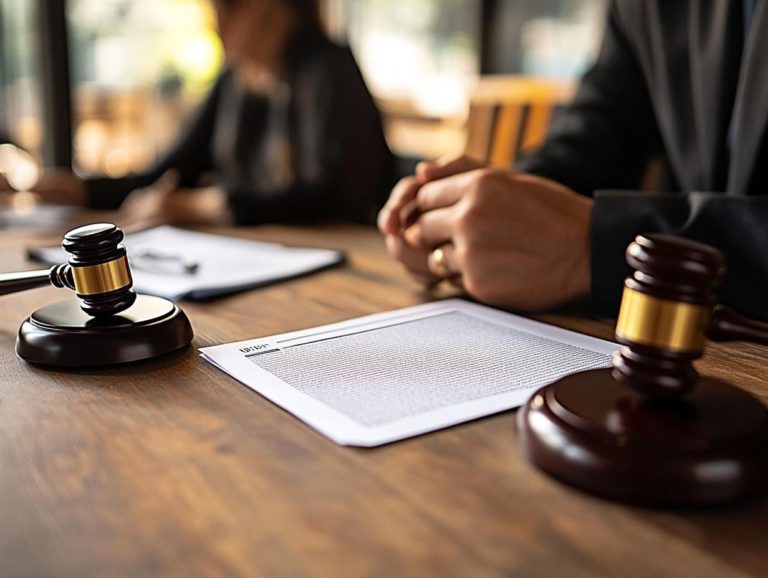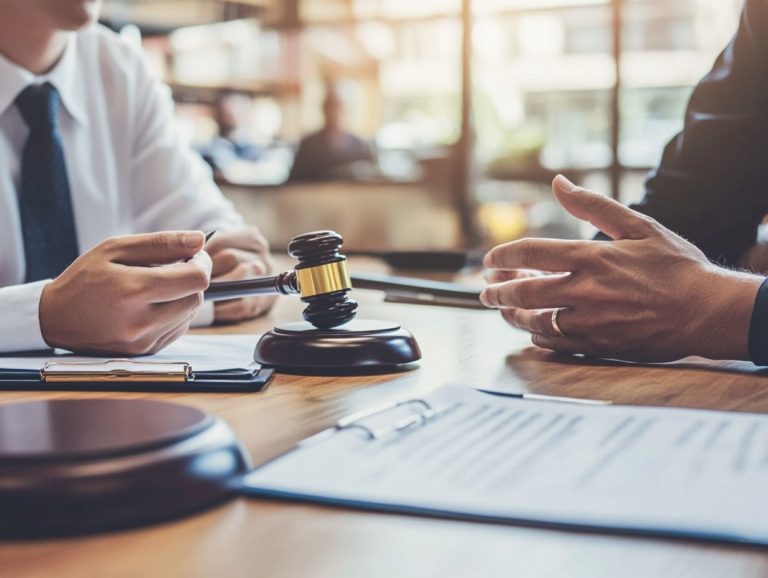How to Handle Attorney Consultations Effectively
Navigating the legal landscape can be quite daunting, especially as you prepare for your consultation with an attorney.
This article provides practical tips to help you maximize your time with a lawyer. You ll find guidance on gathering essential information, setting clear expectations, and understanding legal terms during your meeting.
Moreover, you will learn how to evaluate your consultation, select the right attorney for your needs, and foster effective communication throughout the process. Equip yourself with the knowledge necessary to approach your legal challenges with confidence.
Contents
- Key Takeaways:
- Preparing for an Attorney Consultation
- During the Consultation
- After the Consultation
- Choosing the Right Attorney
- Communication with Your Attorney
- Frequently Asked Questions
- What is the purpose of an attorney consultation?
- How do I prepare for an attorney consultation?
- What should I expect during an attorney consultation?
- How should I communicate with my attorney during the consultation?
- What if I am not satisfied with the attorney consultation?
- Do I have to hire the attorney after the consultation?
Key Takeaways:
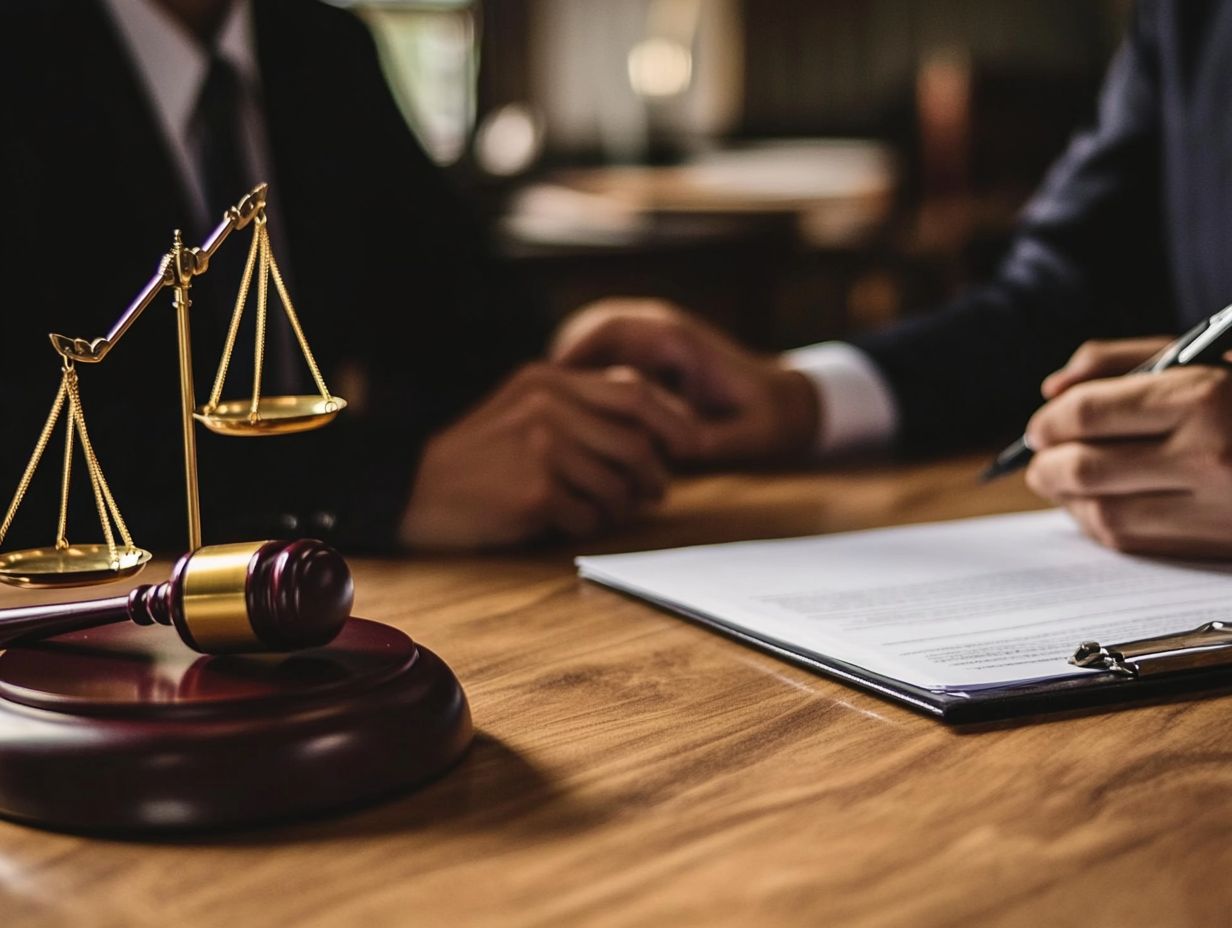
- Prepare for your consultation by gathering all relevant information.
- Set clear expectations and goals.
- Ask questions and take thorough notes during the consultation.
- Evaluate the experience afterward and determine next steps.
- Select the right attorney and establish effective communication.
Preparing for an Attorney Consultation
Preparing for an attorney consultation is essential in securing effective legal services and influences the quality of the attorney-client relationship. By gathering relevant documents and outlining your case, you enhance the efficiency of your initial meeting and ensure you know what to expect from a defense attorney consultation.
Invest time in researching the attorney’s experience and expertise in your specific legal area. This groundwork sets the stage for productive discussions about your needs and expectations.
It s important to understand consultation fees and potential retainer costs. Being financially prepared is crucial, as these can vary significantly between attorneys.
Gathering Relevant Information
To optimize your attorney consultation, gather all relevant documentation and legal questions well in advance. For more insights, consider these tips for communicating with your defense attorney. This preparation ensures you manage your case effectively.
Start by compiling previous legal documents, such as contracts, court filings, and any correspondence related to your case. These materials provide valuable context.
Having these documents readily available helps you formulate specific legal questions and allows your attorney to assess your situation comprehensively. This holistic perspective enhances the analytical process, enabling your attorney to explore relevant legal strategies and outcomes.
A well-prepared meeting lays the groundwork for a productive dialogue, ensuring you receive informed legal guidance.
Setting Expectations and Goals
Setting clear expectations and goals for your consultation is essential. This ensures your attorney fully understands your needs, concerns, and the case strategy you envision.
By articulating these aspects clearly, you establish a foundation for effective communication. It s vital to express any specific worries or complexities surrounding your case, as these can significantly impact the legal advice you receive.
Inquire about your attorney’s qualifications and relevant experience to align your expectations with their expertise. Understanding how your attorney’s background relates to your objectives fosters a collaborative environment and clarifies potential outcomes.
During the Consultation
During your consultation, actively engaging with your attorney is essential for fostering a productive attorney-client relationship. This is your opportunity to seek valuable legal advice and delve deeply into your case strategy, especially if you want to know how to prepare for a consultation with a defense attorney.
By asking relevant questions and taking detailed notes, you ll gain clearer insight into the attorney’s experience and expertise. This understanding will enable you to make informed decisions about your legal representation moving forward.
Asking Questions and Taking Notes
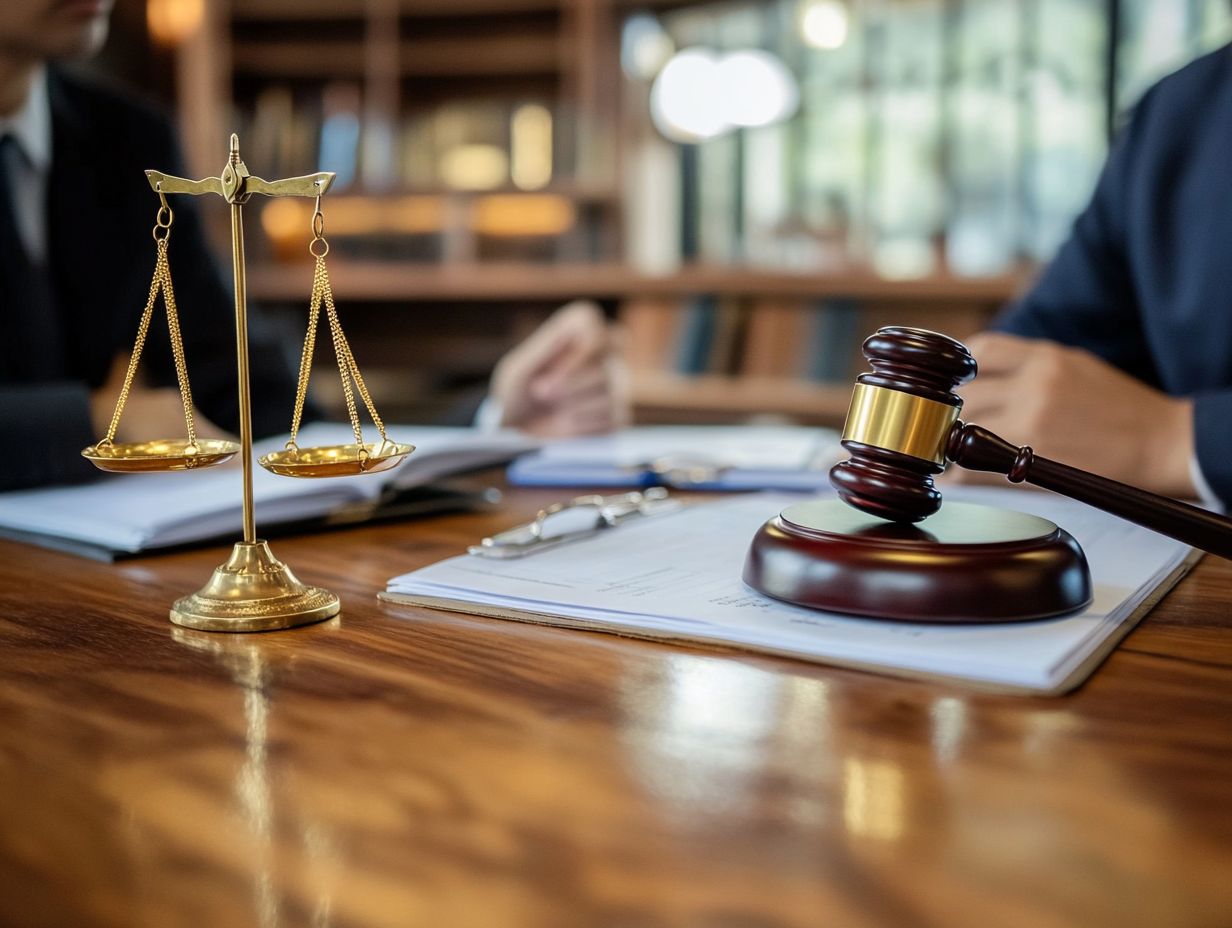
Asking the right legal questions during your consultation can greatly influence your case. It helps you gather essential information and build a strong attorney-client relationship.
This proactive approach clarifies the details of your situation and enables your attorney to tailor their advice to meet your unique needs.
Taking notes during your meeting is crucial. It ensures that critical points are captured for future reference and enhances your overall consultation experience.
By documenting important information, you gain a clearer understanding of your case, which helps you make well-informed decisions as you move forward.
Understanding Legal Jargon
Understanding legal jargon is essential for effective communication with your attorney. It ensures you fully grasp the legal advice provided and fosters a transparent and trustworthy attorney-client relationship.
When you familiarize yourself with common legal terms like “the process of taking legal action,” “plaintiff,” or “settlement,” you can engage more meaningfully in discussions about your case.
This heightened awareness enables you to ask relevant questions and articulate your concerns clearly. An experienced attorney can help demystify these concepts, translating complex terminology into simpler language to enhance your overall understanding.
The more you comprehend the legal landscape, the more empowered you feel, ultimately leading to better decision-making and collaboration throughout the legal process.
After the Consultation
After your consultation, evaluating your experience and determining the next steps is crucial. This process ensures that your legal needs are adequately addressed and that your case is progressing as it should.
Reflecting on your discussions with the attorney will help you pinpoint any concerns or uncertainties. This allows you to make informed decisions regarding potential attorney referrals or the need for further legal representation.
Evaluating the Consultation and Next Steps
Evaluating the consultation process and determining your next steps are crucial for cultivating a robust attorney-client relationship and ensuring your case strategy resonates with your needs. To prepare effectively, consider reviewing what to bring to your first attorney meeting.
To achieve this effectively, assess the quality of communication during your initial meeting. Did the attorney truly listen and comprehensively address your concerns? Pay attention to key factors such as their expertise in relevant areas, responsiveness to your questions, and overall approach to your case.
These insights can reveal how well they grasp your unique situation. Take some time to reflect on your expectations and whether they were met during the consultation; this introspection will guide your future decisions.
By aligning these elements with your overall case strategy, you’ll ensure that the next steps are not merely reactive but also proactive, laying a solid foundation for a collaborative relationship.
Choosing the Right Attorney
Choosing the right attorney is a critical decision that profoundly influences the quality of your legal representation and the outcome of your case.
Take the time to evaluate potential candidates carefully; it can make a huge difference in your case! Consider factors such as their area of expertise, the nature of the attorney-client relationship, and any referral programs available.
By doing so, you can confidently choose an attorney who is best equipped to fulfill your specific legal needs.
Factors to Consider in Selection
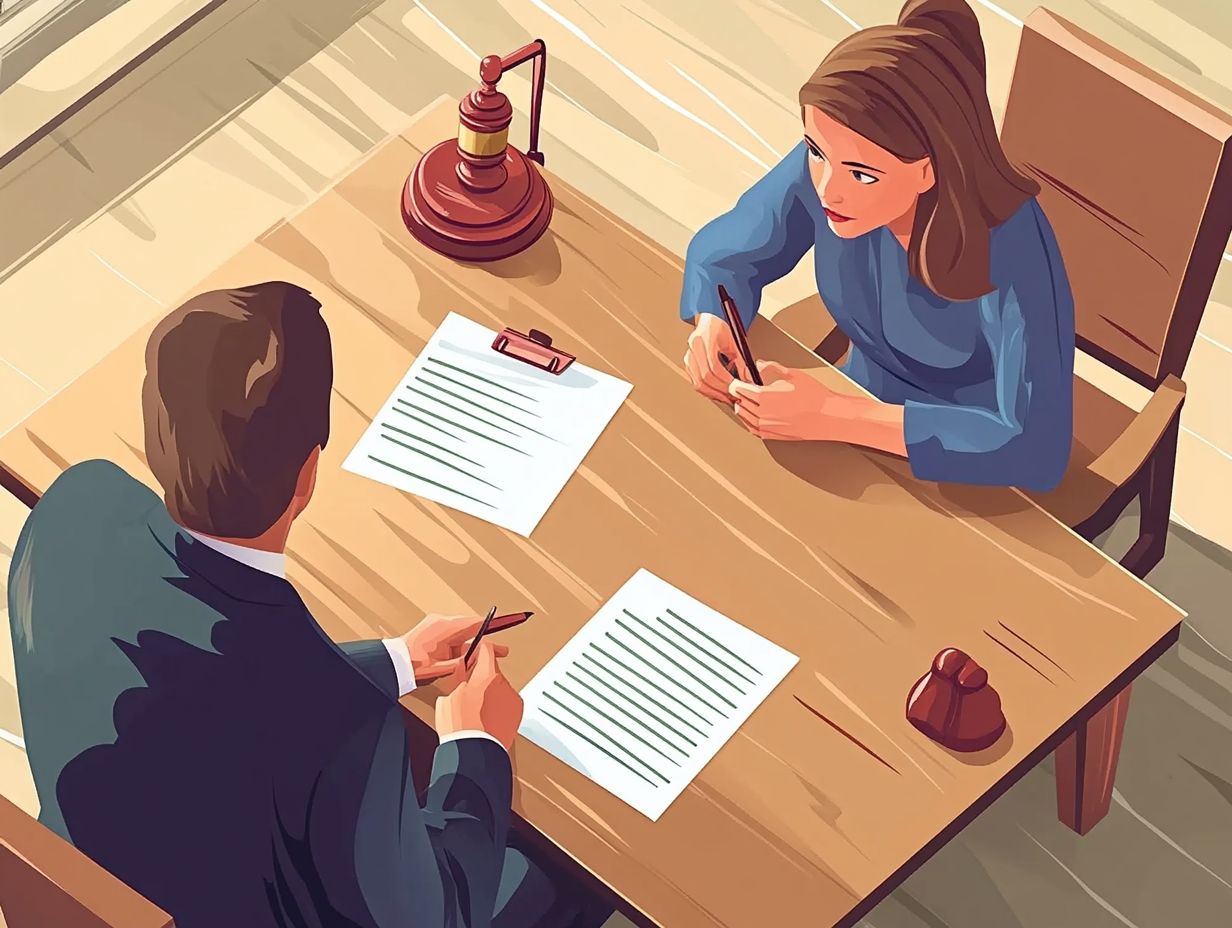
When selecting an attorney, consider several key factors such as qualifications, experience, and communication style. These elements are crucial in ensuring that your lawyer meets your needs.
Choosing the right legal representative requires careful consideration of not just academic credentials but also practical successes in similar cases. A seasoned attorney brings a wealth of knowledge that can significantly enhance your confidence in the legal process.
Effective communication plays a vital role in the attorney-client relationship, fostering trust and transparency. Find an attorney who excels in listening and understanding your needs. This attention to detail can profoundly influence the outcome of your case.
Communication with Your Attorney
Effective communication with your attorney is key to cultivating a robust attorney-client relationship. It sets clear expectations and builds trust, crucial as you navigate legal advice and manage your case effectively.
Establishing and Maintaining Communication
Establishing and maintaining open communication with your attorney is essential for a successful attorney-client relationship, ensuring your legal needs are met throughout the case.
This dynamic allows you to articulate your concerns and expectations, creating a collaborative atmosphere. Regular updates keep you informed and allow your attorney to assess your evolving priorities.
By implementing feedback mechanisms, you encourage a two-way dialogue that enables you and your attorney to adjust strategies as needed. This communication process is crucial for enhancing the quality of legal services and addressing your unique needs, leading to more satisfactory outcomes in your legal matters.
Frequently Asked Questions
What is the purpose of an attorney consultation?
The purpose of an attorney consultation is to discuss your legal matter with a lawyer and receive professional advice on how to proceed. It also allows the attorney to evaluate your case and determine if they are the best fit for you.
How do I prepare for an attorney consultation?
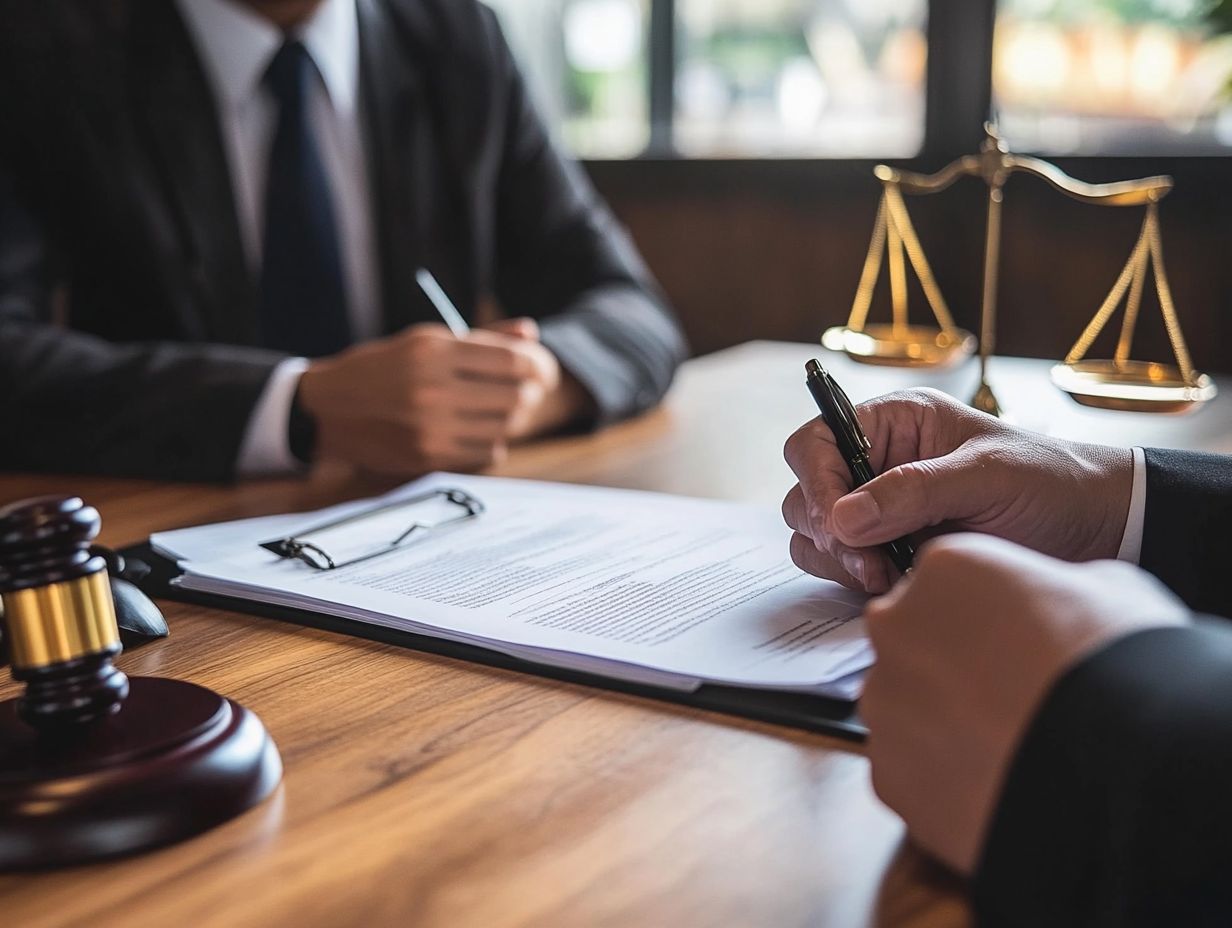
To prepare, gather all relevant documents, such as contracts or court summons, and make a list of questions or concerns. Understanding the importance of client-attorney communication can also enhance your experience, so research the lawyer’s experience in handling similar cases to maximize your consultation.
What should I expect during an attorney consultation?
Wondering what to expect during your consultation? You’ll discover exactly what the lawyer needs from you and how they can help. Expect the lawyer to ask you questions about your case, listen to your concerns, and provide legal advice. They may also discuss their fees and the potential outcome of your case.
How should I communicate with my attorney during the consultation?
It is important to communicate openly and honestly with your attorney during the consultation. Be prepared to answer their questions and provide necessary information. Additionally, consider navigating the attorney selection process to ensure you find the right fit. Don’t hesitate to ask questions or express any concerns you have.
What if I am not satisfied with the attorney consultation?
If you are not satisfied with the consultation, it may be best to seek a second opinion from another lawyer. It is important to find a lawyer who you feel comfortable with and who has experience in handling cases similar to yours.
Do I have to hire the attorney after the consultation?
No, you are not obligated to hire the attorney after the consultation. It is up to you to decide if the lawyer is the best fit for your case and if you feel comfortable working with them. You may also choose to consult with multiple attorneys before making a decision.
Ready to consult an attorney? Start your journey today!


